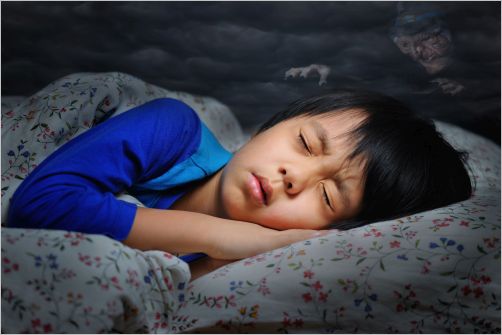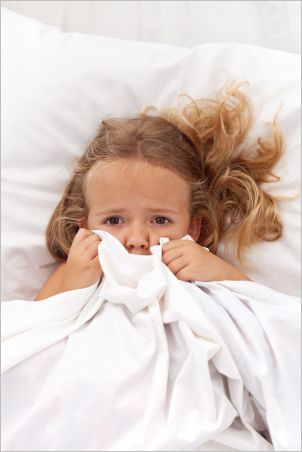What You Should Know About Night Terrors In Toddlers
Night terrors in toddlers may scary and unsettling for parents as well as child. You child may sit up and cry out as if terrified, and there is no obvious reason. Her heart may be racing; she may even get out of bed. But she is not awake. She will pay no attention to your soothing voice, simply because she can’t hear it. There is no way you can calm her agitation. And then, suddenly, it is over and she falls peacefully asleep. When your toddler wakes in the morning, he won’t have any scary memories.

What is the difference between a nightmare and night terrors in toddlers?
• A nightmare is when your child dreams a scary dream, usually after having been frightened or scared during the day. The dream will wake her up; or half wake her up; even if she is still asleep when you come running you will be able to wake her up and console her. The dream will be part of her conscious memory, and she will need some comforting before she can settle down to sleep again.
• A night terror, on the other hand, is simply a sleep disruption—although your child is agitated, this agitation does not seem to be linked to any bad dream or scary mental images. Night terrors are not caused by scary daytime situations, although stress may be a cause. A child undergoing a night terror is inconsolable, and when it is over, it is over, and the child goes straight back into a peaceful sleep.
When Your Child Has a Night Terror

If your toddler has a night terror don’t try to bring him out of it. He is deeply asleep, and you won’t be able to wake him and will only agitate yourself. Sit by him on the bed; hold him if he allows you, but don’t expect any response to your gentle, soothing murmuring. Night terrors can last from five minutes to forty-five minutes, and you will just have to wait it out. When it is finished, your child will fall fast asleep and is likely to sleep well the rest of the night.
Most night terrors take place during the first few hours of sleep, before your child has even started dreaming, and if your child is on a good routine this means it should be well before your bedtime. Still, if your toddler is prone to night terrors it is a good idea to take some precautions before you go to bed; put up the side rail if his bed has one, and pick up any toys that he might hurt himself on.
Preventing Night Terrors
No one knows quite what causes night terrors in toddlers, and because of this it is hard to know what to do to help your little one be quit of them. Children who are stressed or don’t get enough sleep are more likely to have night terrors, though, so make sure your child gets plenty of rest and has peaceful days with a good wind-down routine. Night terrors are also caused by some medications, so if your child is suddenly having night terrors after beginning a new medicine, talk to your doctor.
Night terrors in toddlers are usually outgrown before the child reaches school age, so even if your best efforts ail, know you have a light at the end of the tunnel.
New! Comments
Have your say about what you just read! Leave me a comment in the box below.